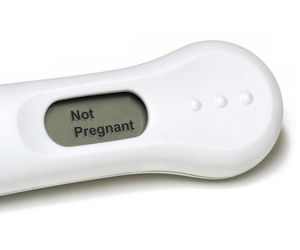 Most women, especially women who wait until later in life to have children, know about the infamous age-35 rule. Once you turn 35, there is a higher risk of babies born with birth defects but, more importantly, a higher risk of never getting pregnant at all.
As a barely-30-year-old woman, I never imagined that I would have difficulty getting pregnant. I also never imagined that I would have so many friends and associates that were battling with the same issue, but who were too afraid or embarrassed to share their stories.
Most women, especially women who wait until later in life to have children, know about the infamous age-35 rule. Once you turn 35, there is a higher risk of babies born with birth defects but, more importantly, a higher risk of never getting pregnant at all.
As a barely-30-year-old woman, I never imagined that I would have difficulty getting pregnant. I also never imagined that I would have so many friends and associates that were battling with the same issue, but who were too afraid or embarrassed to share their stories.
What is Infertility?
According to the American Society for Reproductive Medicine, "infertility is defined as the inability to conceive or carry a pregnancy to term after 12 months of trying to conceive. If you are over the age of 35, the time frame is shortened to 6 months." There are a variety of issues that cause infertility, most of which won't be discovered until a couple fails to get pregnant.
The Stigma
As I walked into the fertility facility for the first time, there was a dry erase board conveniently placed right next to the elevator. On the board was a list of the top 10 strategies on "how to deal with infertility." Some of the strategies included avoiding baby showers and deflecting the conversations about conception, primarily because people can be insensitive about the issue.
My husband and I thought some of the strategies seemed a bit extreme, but there had to be a reason they needed this board. We entered the lobby and it was filled with women who looked like me. They were my age; some dressed professionally, stopping in before work and others were with their husbands.
The one commonality was that no one dared to make eye contact. Everyone was anxious or seemingly on the verge of tears. No one said a word, and as my husband and I conversed about what to expect we received side glances by those who assumed that we didn't know the proper decorum. It was admittedly unsettling. Why did these women feel this way?
Fighting the Stigma
Regardless of how much you accomplish in life, there is still an expectation of becoming a mother. If that doesn't happen quickly, then you must be doing something wrong or there is something wrong with you.
Once my husband and I were married, I was immediately bombarded with questions concerning the creation of miniature versions of ourselves. After a year of no baby, I was then bombarded with questions about why I didn't want to have children - a grossly misguided assumption. Despite the inappropriate comments by those who weren't privileged to know the complete rundown of my medical history, I wasn't prepared for the reactions I would receive once I started sharing my story.
Despite initial reluctance from loved ones, I decided to be completely open about my journey to motherhood. Initially, I started to blog about my journey as an alternative to stressing over pills and shots, but it quickly turned into so much more. I wrote candidly about my struggles and the path that I was taking to become a mother.
As I began to share my story, I immediately received emails from women who thanked me for being so open about my journey. They expressed how they had been struggling for years and felt alone, but were too embarrassed to talk to anyone about it. I realized that my candidness was not for me but for those women who couldn't speak for themselves. There is no shame in your struggle and there is no shame in fighting to become a mother.
For more information about My Journey to Motherhood visit my blog www.fiercefabulousflawless.com.
Tenisha Patterson Brown, Esq.
Forever Fierce, Fabulous & Flawless!









